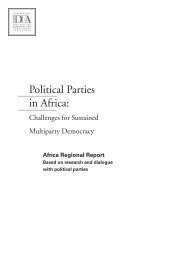HOW TO BUILD A YOUTH WING
HOW TO BUILD A YOUTH WING
HOW TO BUILD A YOUTH WING
Create successful ePaper yourself
Turn your PDF publications into a flip-book with our unique Google optimized e-Paper software.
Cooperating with an opponent with whom you agree to disagree is a wellknown<br />
tool used at all levels of political life – also by youth politicians. Nothing<br />
is better at attracting attention than an unlikely alliance, and you might also<br />
want to consider this in your cooperation with other counterparts!<br />
Having a debate between two political opponents is the perfect way to<br />
enable both sides to present their arguments, ensuring that they will be challenged.<br />
Volunteers often fancy these debates and cheer for their favoured politician.<br />
This is not only a discipline for official MP candidates. Youth wings can<br />
also run debates during and in between election campaigns, addressing political<br />
issues of special interest to young people.<br />
The cooperation with your political ally might be easier to arrange and<br />
agree upon.<br />
Entering into this kind of cooperation, you might still need to compromise.<br />
It is indeed recommended that you make a list of “sensitive issues” beforehand<br />
together with your counterpart(s), and talk them carefully through and<br />
agree on how to handle them. Some of them might be very “practical” but nevertheless<br />
extremely important for your good and sound cooperation. The following<br />
is a list of common sensible issues for inspiration:<br />
How can you work to ensure that all parties are exposed equally in the<br />
press? This is difficult as you cannot control the press, but your spokespersons<br />
might be able to take turns and avoid competing for attention.<br />
How do you ensure that everybody takes on his or her part of the workload<br />
as agreed? A solution could be a lead-party model, in which one youth wing<br />
takes the lead, managing the lion’s share of the workload – but also gets the<br />
main part of the credit/public exposure.<br />
Joint authorship of materials, shared press releases, placement of names<br />
and logos on the material, shared website, etc. may seem like minor issues, but<br />
they can cause tremendous discussion.<br />
Having started with the difficulties, obviously what counts in the long run<br />
is that you decide on your cooperation because the shared political challenge<br />
is too important not to face it together. In joining efforts you communicate to<br />
the world how serious you find the problem and attract much more attention.<br />
When talking about cooperation with others, most parties will mention<br />
their sister parties in other countries as their best friends and counterparts. A<br />
lot of parties will have very good ties and seek to visit each other at least during<br />
the annual Congress. Others will hold annual orbi-annual meetings where they<br />
meet, share, debate and analyse the current political situation in the region and<br />
globally.<br />
“FIGHTING CHICKENS” IN THE NEWSPAPER<br />
Two Danish political youth-wing leaders share a blog on the front web-page of one of<br />
the country’s major dailies. It’s called “Fighting Chicken”. The two bloggers will take<br />
turns to challenge each other – and their mother parties – every other week. The tone<br />
is sharp, yet respectful. The readers tend to like it. They get their weekly dose of strong<br />
political analysis seen from two different points of view. And they will draw their own<br />
conclusions. For the two youth wings, the exposure is obviously invaluable.<br />
<strong>HOW</strong> <strong>TO</strong> <strong>BUILD</strong> A <strong>YOUTH</strong> <strong>WING</strong> DANIsH INsTITUTe fOr pArTIes AND DemOcrAcY pAGe 56
















